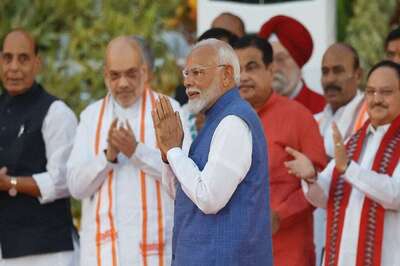
views
October 11 is the 110th birth anniversary of Jayaprakash Narayan (October 11, 1902-October 9, 1979), the legendary freedom fighter and socialist leader who turned to Gandhian ideals and Sarvodaya work later in his life. He had spurned seats of power which could have easily come his way. JP stands more relevant than ever now across the country, especially Kerala which lacks a model for peaceful progress and development. His everlasting contribution was the launching of peaceful struggles to ensure representative character of democratic institutions. The organisers of such resistance now owe something to JP who attempted a successful agitation against the authoritarian tendencies which were endangering the democratic functioning of the institutions After withdrawing from party politics in the 1950s, JP experimented with constructive work like Bhoodan and reforming robbers of Chambal. He also made incisive intervention on various vexed issues which sometimes were not in tandem with the popular mood. But his most valuable contribution to the polity of independent India was highlighting the limitations of representative democracy by bringing to the public domain the quest for enlarging democratic spaces. His movement was dubbed as fascist and anti-democratic. The finer aspects raised by him like bringing people closer to democracy were overlooked. In his concept of Total Revolution, JP emphasised complete transformation of the individual. He visualised rooting out corruption, decentralisation through Janata Sirkars (despised as parallel governments), annihilation of caste system, land reforms, electoral reforms and right to recall and last but not the least a Lok Pal also. Unfortunately, the credit due has never been given to the visionary who raised these issues with passion and commitment. JP’s movement taught the relevance of mass agitations when the representative democracy falls prey to authoritarian temptation. JP’s most admirable contribution was emphasising the right of the common man to act when representative loses the mandate and this is a major corrective in a democracy. Though JP movement which had substantial Sangh Parivar participation could easily get the epithet fascist, it did not deserve the same. JP was never a Hindutva ideologue, given his stand on many national issues. His path to socialism through transformation of individual is more relevant than ever, when capitalism is under siege and totalitarian state capitalism failed to deliver. Though still a nebulous concept, it is an idea worth exploring and attempting. As regards democratic polity in India, JP’s intervention has made another emergency an impossibility in India, though the political experiment he built up failed miserably. JP also showed that the democratic institutions need constant watch and vigil. It was the common man who defeated authoritarianism through the ballot box, in which JP’s efforts were not mean. Anna Hazare’s movement has also raised the issue of the right to recall and the electoral reforms. Land reforms have also been mentioned as a goal by Anna. In the interregnum between the JP’s movement and the present movements, a number of activists came forward to take up the cause of the right to information and proper rehabilitation of those affected by eviction.But what makes JP different from the present day civil society activists? The present day activists have turned a blind eye to the call for support from Irom Sharmila, unlike JP who never brushed aside any struggle in any part of the country. (The author is a researcher on issues of federal polity in India).


















Comments
0 comment